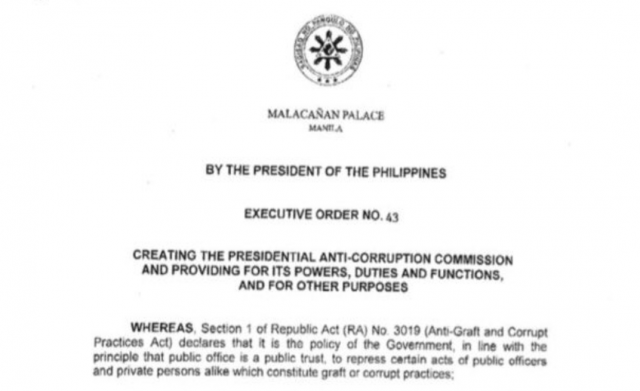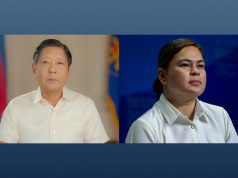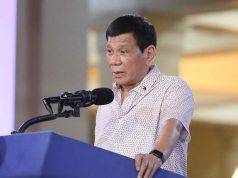(UPDATE – 10:30 p.m.) MANILA – President Rodrigo Duterte has signed Executive Order No. 43, creating the Presidential Anti-Corruption Commission, which will have the power, “concurrently with the Office of the Ombudsman,” to investigate the administrative cases of presidential appointees in the Executive Branch which involve graft and corruption.
The Presidential Anti-Corruption Commission (PACC) will be under the Office of the President, and will be primarily made up of a chairperson and four commissioners, all appointed by the President, and majority being lawyers.
Section 12 OF The new EO also transfers to the PACC the investigatory, recommendatory and other incidental functions of the defunct Presidential Anti-graft Commission, which were earlier transferred to the Office of the Deputy Executive Secretary for Legal Affairs (ODESLA).
Upon the President’s instructions, or motu propio, the PACC may conduct fact-finding inquiries and lifestyle checks on presidential appointees even outside the Executive Branch if they violate the Constitution, as well. Based on these, the commission will submit a report and its recommendations to the President.
This development follows Duterte’s pronouncement that he will investigate the “biased and corrupt” Office of the Ombudsman, which has been looking into his and his family’s wealth.
“You’ll be investigated also. One of these days, kayo ang sigurado kong hahabulin dahil nga ‘yong partiality ninyo [I’m sure you’ll be the one pursued because of your partiality],” Duterte said in a taped interview with PTV, which was aired last week.
“‘Pag hindi ninyo imbestigahan sarili ninyo, ako ang magset-up ng [If you don’t investigate yourselves, I will be the one setting up a commission to investigate you as a President with investigating powers,” he said.
According to Far Eastern University Institute of Law Dean and TV5 legal analyst Atty. Mel Sta. Maria, the Ombudsman is a presidential appointee, “but once appointed, she or he becomes a constitutional officer, like a Supreme Court justice.”
Sta. Maria believes the Office of the President may intend that the issue of whether or not a deputy ombudsman is within the jurisdiction of the Office of the President be raised before the Supreme Court. In the case of Gonzalez vs. Ochoa, the Supreme Court originally said that the Office of the President has jurisdiction over the deputy ombudsman.
“However, upon motion for reconsideration, the Supreme Court reconsidered and said the deputy ombudsman is not within the Office of the President because, if it is so, it will violate the independence of the Ombudsman. The motion for reconsideration was decided by a swing vote, meaning 8-7. Just one vote did it for unconstitutionality. So, maybe their intention is for the Office of the Ombudsman to again elevate the matter to the SC,” Sta. Maria pointed out.
“Based on prior decisions like the Marcos burial and the Martial Law issue, it seems that the leaning of the Supreme Court is to give the President the decision all the time,” he added.
According to Executive Secretary Salvador Medialdea, Duterte “will not usurp the power to discipline certain independent constitutional officers such as the Ombudsman and judicial officials.”
He also noted that the President, as appointing authority, is not prohibited by law or by the Constitution to conduct lifestyle checks on his own appointees.
Under the EO, the President may also instruct the Presidential Anti-Corruption Commission to investigate presidential appointees in the Armed Forces of the Philippines and the Philippine National Police.
Upon filing a complaint or a charge, the commission may recommend to the President the issuance of preventive suspension, especially in circumstances where the official’s stay in office may get in the way of a “fair determination of the case.” This preventive suspension will last until the case is “terminated” by the commission, but cannot last more than 90 days, unless the delay is the official’s fault. In such instances, the period of delay will not be counted in the 90 days.
The EO states that if the commission deems it necessary, it may refer a case for appropriate action to the Office of the Ombudsman, or deputize any other government body to conduct a fact-finding investigation.
The Office of the Deputy Executive Secretary for Legal Affairs, to which the functions of the defunct PAGC were previously transferred, will continue to perform its functions of formulating national anti-corruption plans, policies, and strategies, implementing anti-corruption initiatives, and monitoring compliance.
The prefatory text of the EO argues that the President’s power to appoint comes with the power to discipline and remove public officials and employees, except those who are not subject to this as provided by the Constitution and existing laws.
The EO also states that the President’s “plenary powers” as head of government give him the authority to conduct lifestyle checks and fact-finding inquiries on all public officials and employees.
The EO also says there is a need to create a separate commission “solely dedicated” to providing assistance to the President in the investigation and hearing of administrative cases and complaints, and in the conduct of lifestyle checks and fact-finding inquiries concerning presidential appointees and other officials allegedly involved in graft and corruptions or who have committed other “high crimes” and violations. (With a report from Maricel Halili, News5)
Click and watch this video report below:
FULL TEXT OF E.O. 42 BELOW:










